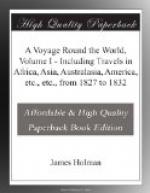The battle of Essamacow, which is registered in the Gold Coast Almanack, with the significant prefix of “fatal,” was fought on the 21st of January, 1824. Hostilities commenced about two o’clock in the afternoon, when both parties opened a brisk fire across a small river, that separated their forces. Our troops consisted of only a few regulars, a small body of militia, and some irregular native allies, the whole commanded in person by his Excellency Sir Charles McCarthy, Governor of Sierra Leone.
The regulars and militia alone were armed with bayonets, so that, in the event of close collision, in which, unfortunately, this conflict terminated, we were at a fearful disadvantage, contending against a foe so much superior in numbers, and so expert in the use of their hand-arms. The firing across the river continued for four hours, but at six o’clock in the evening, the English were compelled to cease in consequence of having exhausted all their remaining ammunition. The Ashantees, perceiving the difficulty in which our troops were placed, resolved to turn the opportunity to immediate account, and, uttering discordant yells, rushed into the river, and advanced en masse upon our forces. Sir Charles McCarthy saw that there was but one means of resistance left, and received the tumultuous enemy at the point of the bayonet. For some time, the steadiness and courage of the English prevailed over the barbarian rage of the multitudes that threw themselves upon their “serried ranks,” and the Ashantees fell in rapid succession; but it soon became evident that the strictest discipline of such an inferior body, could not withstand the increasing crowds that poured upon them: the English soldiers, finding themselves so hemmed in that their muskets became inconvenient to them, for want of space to exercise their arms with freedom, relieved themselves from the encumbrance by unfixing their bayonets, and casting their muskets away. With this awkward weapon they continued the engagement against an enemy armed with long knives, in the use of which every Ashantee is singularly skilful. All the advantages of European knowledge and cooperation, were at an end. It now became a terrific scene of slaughter, in which physical power had the inevitable superiority. Opposed to such infuriated masses, the coolness of the English was of no avail. They fell quickly before the knives of the Ashantees, exhausted from the loss of blood, and covered with numberless wounds. Happily their sufferings were of short duration, for the enemy, in the fulfilment of a barbarous usage, cut off their heads as they fell, as trophies of their own personal prowess.
Sir Charles McCarthy saw that the day was lost, and that it would be but an inglorious sacrifice of his own staff, and the few soldiers that yet remained, to continue on the field. He, therefore, prepared to retire; but this resolution—which, in the breast of so brave an officer, was slow to find a place—was taken too late. A large body of the enemy had already advanced upon his rear, and intercepted his retreat. All hope, even of escape, was now cut off. The victory of the Ashantees was complete: and nothing but conjecture is left as to the cruel sufferings which were inflicted upon our gallant countrymen and allies before they surrendered their spirits to their Creator on that fatal day.




